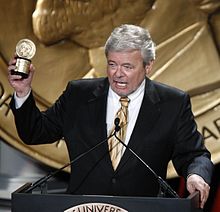George Knapp (journalist)
| George Knapp | |
|---|---|

Knapp at the 68th Annual Peabody Awards
|
|
| Born |
April 18, 1952 Woodbury, New Jersey, U.S. |
| Residence | Las Vegas, Nevada, U.S. |
| Nationality | American |
| Alma mater |
University of the Pacific (M.A.) University of West Georgia (B.A.) |
| Occupation | Journalist and talk radio host |
| Known for | Coast to Coast AM |
| Television | KLAS-TV |
George Knapp (born April 18, 1952) is an American television investigative journalist, news anchor, and talk radio host. Knapp is recognized with an Edward R. Murrow Award, Peabody Award, and as a recipient of over a dozen Emmys.
A longtime fixture in Las Vegas media, he works at KLAS-TV and is also a frequent host of the Sunday night/Monday morning Coast To Coast AM syndicated radio show. He is known for his work on anomalous phenomena, which is a frequent topic of the Coast to Coast show. George Knapp hosts Coast to Coast AM on the 3rd and 4th Sundays of the month and sometimes the 5th.
Born in Woodbury, New Jersey, Knapp grew up in Northern California and graduated from in , where he was the senior class president. He earned a bachelor's degree in communication from University of West Georgia and a master's degree in the same field from University of the Pacific. He taught debate and forensics at both the University of the Pacific and University of California, Berkeley.
He moved to Las Vegas in the early 1980s, working first as a cab driver before being hired as an intern and then a news reporter at a PBS station. From there, Knapp was hired as a reporter and news anchor for KLAS. Knapp became known nationally in the late 1980s by reporting the story of Bob Lazar, who claimed to have worked on extraterrestrial UFOs at the secretive Area 51. Due in part to Knapp's discovery of evidence corroborating some of Lazar's claims, Knapp's stories on Lazar were taken more seriously than typical UFO fare. In 1990, Knapp's stories on Lazar earned an "Individual Achievement by a Journalist" award from the United Press International. However, to Knapp's "eternal shame," he also during this era publicized the claims of conspiracy theorist Bill Cooper, whom Knapp came to regard as far less credible than Lazar.
...
Wikipedia
